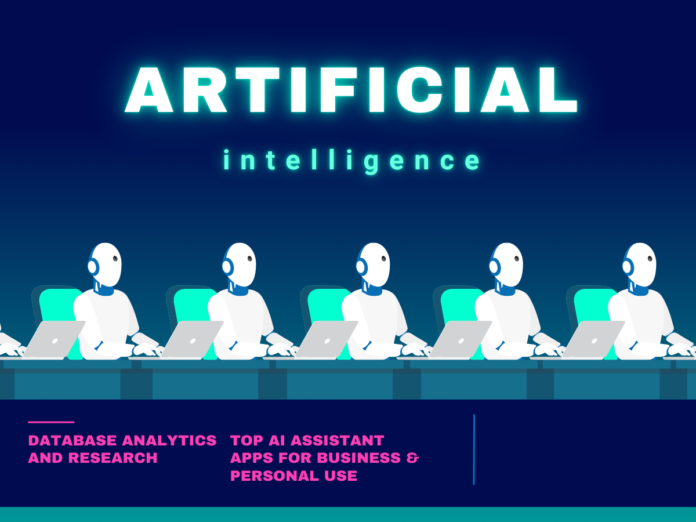AI assistants have largely established a dominant position in our everyday life, due to the fact that they provide a wealth of different services that are really helpful in personal matters, and they make businessmen more effective and efficient. This writing explores the different kinds of AI assistants, their advantages, and the ways they can be applied in different sectors.
What is an AI Assistant?
An Artificial intelligence assistant is a software program that uses advanced artificial technology to grasp and reply to humans’ queries and demands in the form of writing and speaking. These virtual helpers can fulfill a wide range of tasks similar to planning and attending meetings, scheduling and appointing meetings and even carrying out a text-to-speech analysis. They are running the processes of Artificial Intelligence for interpreting the really hard inquiries and then proffering the exact applicable data stored in the repository to the user questions.
Types of AI Assistants

AI assistants can be broadly categorized based on their applications and functionalities. Here are some significant types:
1. Customer Service AI Assistants
These AI assistants are intended to address customer questions, provide immediate responses, and divert calls and messages from overburdened human agents. They enhance the overall customer experience by providing accurate and timely information.
2. Sales AI Assistants
Sales Artificial intelligence assistants automate repetitive tasks like data entry, scheduling, and lead follow-up. This facilitates the sales professionals in concentrating on more strategic endeavors.
3. Consumer AI Assistants
Consumer Artificial intelligence assistants, such as Amazon Alexa and Google Assistant, which are phones which are typically used for private use. For example, they can run chores like playing music, setting alarms, and controlling smart home devices which are possible for people in the future with standard capabilities.
4. Healthcare AI Assistants
Artificial intelligence, in the medical domain, can be utilized by digital robots to have elements of interactive communication in the appointments with healthcare staff, analyzing symptoms, and providing treatments. These AI solutions, for instance, are commercially available products that aid in the detection of pathologies on chest X-rays that is done automatically without human intervention.
5. Insurance AI Assistants
The duties of the personnel in charge of an insurance company can now be carried out with the help of the automated claim system, policy queries, and provision of customized insurance recommendations by these assistants.
6. Utilities AI Assistants
Artificial intelligence assistants, which are basically the same as human agents in the utilities sector, can manage the customers’ inquiries, supply the users’ lighting problem information backing up devs and allow for billing issues, which will lead to the enhancement of the client’s satisfaction.
Popular AI Assistants
Several Artificial intelligence assistants have gained popularity due to their advanced features and wide range of applications. Here are some notable examples:
1. Google Assistant
Google Assistant is a powerful AI that works on various devices, including phones, watches, TVs, and cars. It excels in informational retrieval and real-time translation.
2. Amazon Alexa

Alexa is a cloud-based voice assistant available on Amazon devices and other third-party devices. It is generally recognized to be useful and efficient at home, smart home devices, and other everyday tasks, such as playing music and getting news updates.
3. Apple Siri
Siri is Apple’s Artificial intelligence assistant, available on iOS devices. It can perform functions such as answering questions, making recommendations, and making phone calls.
4. Microsoft Copilot
After discontinuing Cortana, Microsoft launched Copilot, a chatbox developed on a large language model. It can summarize documents, create images, and integrate with Microsoft Office applications.
5. ChatGPT
OpenAI’s GPT-4 model drives the ChatGPT AI conversation agent, which is popular for its conversational skills and is used in many tasks, such as customer support and text production.
Benefits of AI Assistants
Artificial intelligence assistants offer numerous benefits that make them indispensable in both personal and professional settings:
1. Increased Productivity
Artificial intelligence assistants help users in managing routine tasks giving them space to devote to necessary commitments. They are capable of picking up email, putting dates to meetings as well as maintaining the calendar.
2. 24/7 Availability
Unlike human assistants, AI can work all the time of the day, providing support and doing tasks, 24/7.
3. Data Analysis
AI assistants are able to instantaneously process huge quantities of data and thereby generate substantial insights and actual recommendations on the spot, making the decision-making experience more productive.
4. Enhanced Customer Experience
By providing instant and accurate responses, Artificial Iintelligence assistants improve customer satisfaction and reduce the workload on human agents.
5. Cost-Effectiveness
AI assistants can perform tasks that would otherwise require multiple human employees, thereby reducing operational costs.
Challenges and Considerations
Despite their numerous benefits, AI assistants also face several challenges:
1. Privacy and Security
Data security and privacy are major concerns, as AI assistants often handle sensitive information. Ensuring robust security measures is crucial to prevent data breaches.
2. Understanding Human Nuances
AI assistants might have difficulty in getting human interactions nuances like sarcasm, irony and non-verbals properly.
3. Ethical Considerations
The use of AI raises concerns that are of ethical nature, such as the problem of unfairness in the AI algorithms, and the possibility of job displacement.
Conclusion
The progression and enhancement of digital technology have made the interactions between AI assistants and human beings more intricate and exciting. The AI assistants are utilizing certain features that increase the efficiency and the quality of the customer’s experience. With the rise of technology, AI assistants are expected to become more powerful, which will result in their greater influence on our daily lives. Nevertheless, the identification of regulation, security, and the moral dimensions will be critical for the persistence of innovation in AI and the existence of AI technology among the mass population.


